Signs of the Times • 6 September 2017 • No. 135
Special issue
Deferred Action for Childhood Arrivals (DACA)
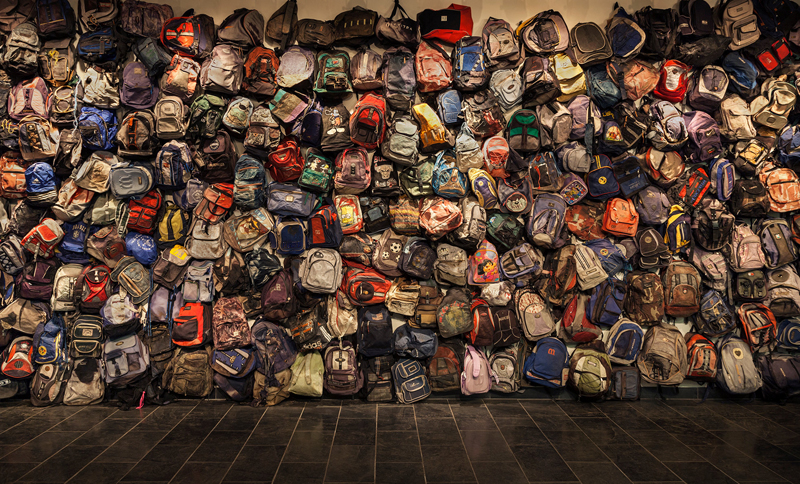
Above: Display of backpacks left by migrants attempting to cross the Sonoran Desert in Arizona, displayed at the Parson School of Design. The backpacks were exhibited in the show “State of Exception/Estado de Excepción.” Photo by Richard Barnes
¶ Processional. “Ice El Hielo,” La Santa Cecilia [Lyrics in English translation: “ICE [Immigration and Customs Enforcement] is loose over those streets. / We never know when it will be our turn. / They cry, the children cry at the doorway, / They cry when they see that their mother will not come back.”]
¶ Invocation. “Clandestino,” Manu Ahao, [English translation: “I come only with my punishment / There comes only my conviction / Running is my fate / In order to deceive the law / Lost in the heart / Of the great Babylon / They call me the Clandestine / 'cause I don't carry any identity papers.”
¶ Call to worship. “Gracious One, who jealously guards the lives of those at every edge, we lift our heavy hearts to your Mercy. / We live in a fretful land, anxious over the ebbing away of privilege, fearful that strangers are stealing our birthright. / Aliens breaching our borders. / Refugees threatening our security. / Loud, insistent voices demand a return to ‘the rule of law.’ / Speak to us of the Rule of your law, the terms of your Reign. Incline our hearts to your command.” —continue reading “You shall also love the stranger: A litany for worship, using texts on immigration”
¶ Hymn of praise. “Livin' in a city where the dreams of men / Reach up to touch the sky and then / Tumble back down to earth again / Livin' in a city that never quits / Livin' in a city where the streets are paved / With good 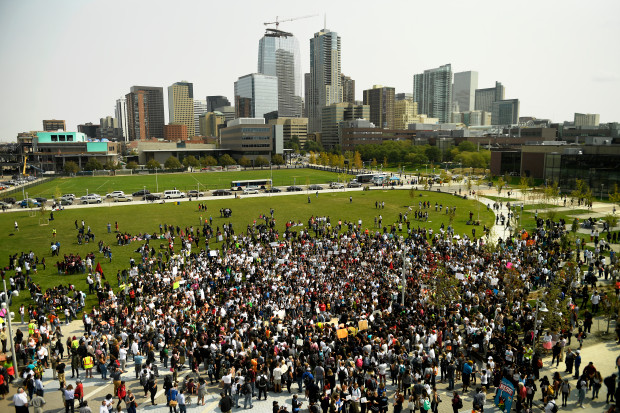 intentions and a people's faith / In the sacred promise a statue made / Livin' in a city of immigrants.” —Steve Earle, “City of Immigrants”
intentions and a people's faith / In the sacred promise a statue made / Livin' in a city of immigrants.” —Steve Earle, “City of Immigrants”
¶ And a child shall lead. “At least two high schools in Denver, Colo., allowed students to collectively walk out of class Tuesday (see photo at right) to protest the Trump administration’s termination of the Deferred Action for Childhood Arrivals program. Students at North High School and West High School walked out of school mid-morning to ‘protest’ in support of DACA, an Obama-era program that unilaterally granted temporary amnesty to hundreds of thousands” of children brought to the US by their parents. Watch this video of the march. (1:07)
¶ Confession. “Groaning with sighs too deep for words, singing our woebegone songs for the world that is promised from beyond every prediction, / beyond every market forecast, beyond every rule of engagement, beyond—at times—even our own faltering faith. / It is for that Bright Land that we intercede! / Its merciful manna is ours to neither hoard nor dispense. We are not its border guards. / All are immigrants to that Beloved Community into whose citizenship we are invited, for whose establishment we are committed, by whose joyful refrain our tongues cannot be restrained.” —continue reading “For that Bright Land: A litany for worship inspired by Romans 8:18-27”
¶ Take this brief (2:18) animated video tour with Robert Reich on the topic “The Facts About Immigration.”
¶ Hymn of assurance. “And I’ll rise up / I'll rise like the day / I’ll rise up / I'll rise unafraid / I'll rise up / And I’ll do it a thousand times again / And I’ll rise up / High like the waves / I’ll rise up / In spite of the ache / I'll rise up / And I’ll do it a thousands times again / For you.” —Andra Day, “Rise Up”
¶ The Deferred Action for Childhood Arrivals (DACA) background. “In the 1990s to mid-2000s, the US started building up enforcement on the US-Mexico border, with a huge unintended consequence: Many unauthorized immigrants avoided repeated risky border crossings by settling in the US with their families. (Previously,  unauthorized immigrants had mostly been working-age men who crossed back and forth to the US for work while their families stayed in their home countries.)
unauthorized immigrants had mostly been working-age men who crossed back and forth to the US for work while their families stayed in their home countries.)
“Around the same time, changes to US law made it nearly impossible for an immigrant to get legal status if they’d lived in the country illegally. So the children who crossed illegally into the US with their parents were growing up in a country where they could never become legal residents or citizens.
“These children became known as DREAMers, after the DREAM [Development, Relief and Education for Alien Minors] Act, a piece of legislation meant to give them a path to citizenship first introduced in 2001. But with that legislation stalled in Congress, President Barack Obama in 2012 created the DACA program. While it didn’t give them a path to citizenship, DACA offered DREAMers a temporary grant of protection from deportation and a permit to work legally in the US.” —Dana Lind, “9 facts that explain DACA, the immigration program Trump is threatening to end: How DACA works, who it protects, and what will happen to immigrants if Trump shuts it down” Also see Julia Glum, “DACA by the Numbers: 15 Facts About the Youth Immigration Program Trump Could Soon Shut Down,” Newsweek
• Some 800,000 people, average age of 25, are now registered in the DACA program, though 1.3 million are eligible.
• On average, these children were 6.5 year old when they arrived.
• They must have come to the U.S. before turning 16. They must have lived in the U.S. since June 15, 2007.
• Their average hourly wage is $17.46 an hour, up from $10.29 before receiving DACA. About 72% of respondents were in higher e ducation.
ducation.
• More than 1,800 governors, attorneys general, mayors, state representatives, judges, police chiefs and other leaders signed onto a letter supporting Dreamers and DACA recipients.
• Nearly 80% said they got driver's licenses. About half became organ donors.
• Because DACA recipients gave extensive personal information to the government when they applied, many of them could easily be tracked down.
• The cost to apply for DACA status is $495. Once granted, it must be renewed every two years costing another $495 each time.
• More than 97% are in school or in the workforce, 5% started their own business, 65% have purchased a vehicle, and 16% have purchased their first home. At least 72% of the top 25 Fortune 500 companies count DACA recipients among their employees.
¶ Hymn of intercession. “Save me from this prison / Lord, help me get away / Cause only you can save me now from this misery / I've been lost in my own place, and I'm gettin' weary / How far is heaven?” —Los Lonely Boys, “Heaven” (Thanks Randy.)
¶ “[Attorney General] Jeff Sessions is wrong. These kids are not taking jobs from American citizens. . . . The compassionate thing to do is to give these kids legal status, let them become citizens, they are all non-felons, they have no other country to go to.” —Republican Senator Lindsay Graham (SC), on NBC’s “Today” show
¶ “A Moody’s Analytics analysis of Trump's proposed economic policies last year showed that removing all undocumented immigrants from the labor force would trigger an economic recession within one year.” —Tracy Jan, “White House claims ‘dreamers’ take jobs away from blacks and Hispanics. Here’s the truth,” Washington Post
¶ Undocumented immigrants paid $13 billion into the retirement trust fund [Social Security] in 2010, and only 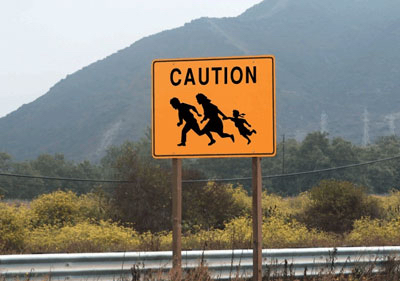 got about $1 billion in benefits. Also, they paid about $10.6 billion in state and local taxes. —Alexia Fernandez Campbell, “The Truth About Undocumented Immigrants and Taxes”
got about $1 billion in benefits. Also, they paid about $10.6 billion in state and local taxes. —Alexia Fernandez Campbell, “The Truth About Undocumented Immigrants and Taxes”
¶ At last count, more than 400 business executives had signed a letter supporting the DACA program, saying “Our economy would lose $460.3 billion from the national GDP and $24.6 billion in Social Security and Medicare tax contributions.” —“Open Letter From Leaders of American Industry”
¶ “Rescinding DACA Would Impose Massive Costs on Employers,” David Bier, Newsweek.
¶ Only 15% of Americans believe those in the DACA program should be deported. 58% believe the immigrants should be allowed a path to citizenship; 18% believe they should be allowed to become legal residents. —Politico
¶ “The Hamilton Mixtape: Immigrants (We Get The Job Done),” K'naan featuring Residente, Riz MC & Snow Tha Product.
Only Mass Deportation Can Save America
“In the matter of immigration, mark this conservative columnist down as strongly pro-deportation. The United States has too many people who don’t work hard, don’t believe in God, don’t contribute much to society and don’t appreciate the greatness of the American system. They need to return whence they came."
Why?
• “Nonimmigrants are incarcerated at nearly twice the rate of illegal immigrants, and at more than three times the rate of legal ones.”
• “Just 17 % of the finalists in the 2016 Intel Science Talent Search—often called the ‘Junior Nobel Prize’—were the children of Uni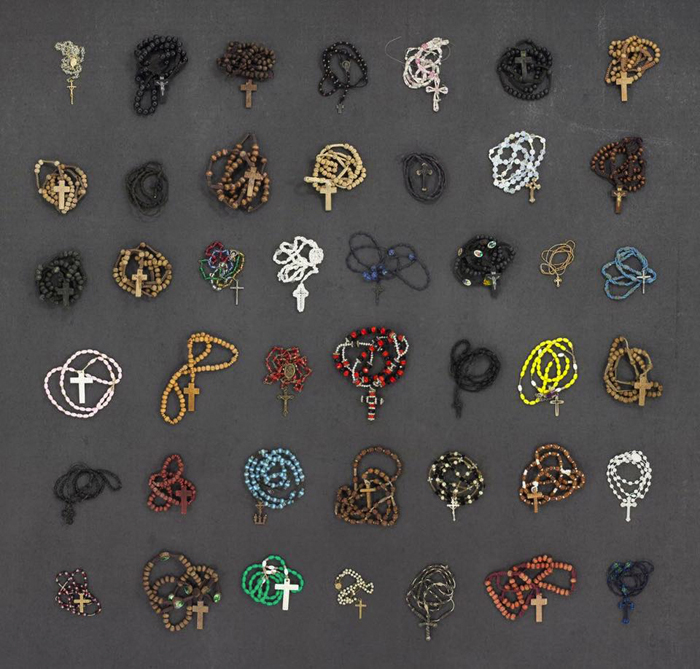 ted States-born parents.”
ted States-born parents.”
• “More illegal immigrants identify as Christian (83%) than do Americans (70.6%).”
• “The rate of out-of-wedlock births for United States-born mothers exceeds the rate for foreign-born moms, 42% to 33%.”
Right: Rosaries confiscated by US border patrol agents.
• “The rate of delinquency and criminality among nonimmigrant teens considerably exceeds that of their immigrant peers.”
“So how does America become great again by berating and evicting its most energetic, enterprising, law-abiding, job-creating, idea-generating, self-multiplying and God-fearing people?” —Bret Stephens, New York Times
¶ “What makes a gringo your smart aleck lingo / When he stole this land from the Indian way back when / Don't he remember the big money lender / That put him a lincoln parked where his pinto had been / The almighty peso that gives him the say so / To dry up the river whenever there's crops to bring in / Such a good neighbor to take all his labor / Chase him back over the border till he's needed again.” —Merle Haggard, “The Immigrant”
¶ Listen to a reading of biblical texts on immigrants, read from The Riverside Church in New York City (1:02 video).
¶ Read “Strangers and Aliens: A collection of biblical texts regarding the fate of immigrants”
¶ “The Prayer of the Refugee,” Rise Against.
¶ Analogy. Suppose you are one among the many who lost your home and possessions to Hurricane Harvey. (Some of you many not have to “suppose.”) But now, instead of the awful labor of rebuilding, you are actually 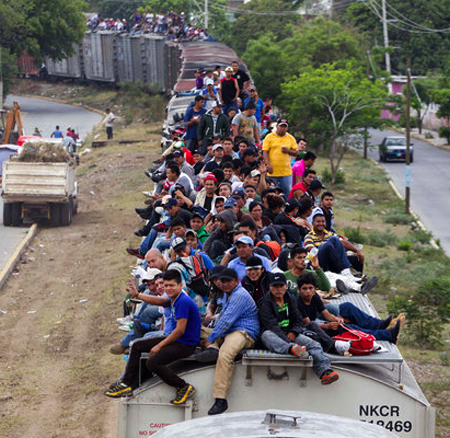 deported for something your parents did. That’s the fate Dreamers are currently facing.
deported for something your parents did. That’s the fate Dreamers are currently facing.
Left: Migrants ride on top of a northern bound train in Mexico toward the US-Mexico border.
¶ Between October 2000 to September 2016, the US Border Patrol has documented 6,023 deaths of immigrants attempting to cross into the US from Mexico. “I would say for every one we find, we’re probably missing five,” said Sheriff Urbino Martinez of Brooks County, Texas.
“If this were any other context, if these were deaths as a result of a mass flood or an earthquake or a major plane crash, people would be talking about this as being a mass disaster,” said Daniel E. Martinez, an assistant professor of sociology at George Washington University. —Manny Fernandez, “A Path to America: Marked by More and More Bodies,” New York Times
¶ Can’t make this sh*t up. The New York Times reported Tuesday that administration officials privately raised concerns as late as one hour before the announcement about Trump's understanding of the effects of rescinding DACA. —Rebecca Savransky, The Hill
¶ “If You’re Outraged By Trump’s DACA Decision, Here’s How You Can Help Recipients Like Me.” —Pierre R. Berastain, HuffPost
¶ Preach it. “If you are neutral in situations of injustice, you have chosen the side of the oppressor.” —South African Bishop Desmond Tutu
¶ Call to the table. “This Land is Your Land,” Sharon Jones & the Dap-Kings.
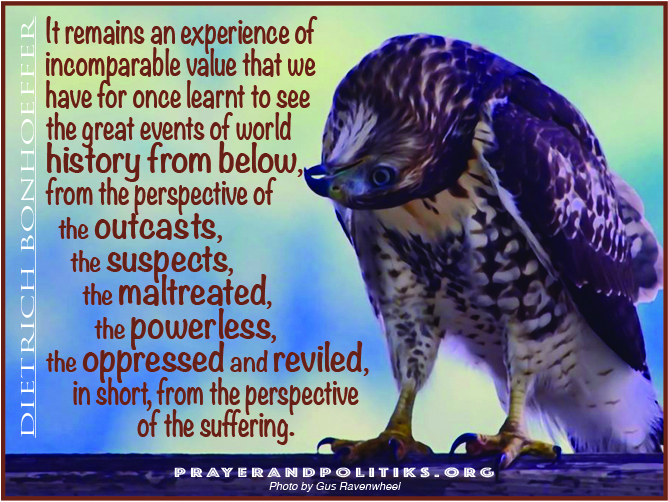 ¶ Altar call. “Todos Somos Ilegales” (“We Are All Illegals”), Residente, Tom Morello & Chad Smith.
¶ Altar call. “Todos Somos Ilegales” (“We Are All Illegals”), Residente, Tom Morello & Chad Smith.
¶ The Hymn Society in the United States and Canada is pleased to announce the release of Singing Welcome: Hymns and Songs of Hospitality to Refugees and Immigrants, a collection of 46 hymns and songs available for free download from The Hymn Society’s website.
¶ Benediction. “Love does no wrong to a neighbor.” —Romans 13:10
¶ Recessional. “To dance the Bamba / one needs a bit of grace. / A bit of grace for me, for you, / now come on, come on, / for you I'll be, for you I'll be, for you I'll be. “ —Los Lobos & Gipsy Queens, “La Bamba”
¶ Just for fun. A drone’s-eye-view of a fireworks show. (4:07 video. Thanks Donna.)
# # #
Featured this week on prayer&politiks
• “Out of the house of slavery,” a Bible study on immigration
• “You shall also love the stranger,” a litany for worship, using texts on immigration
• “Strangers and Aliens,” a collection of biblical texts regarding the fate of immigrants
Other features
• “Tired of being mean,” a response to the “Nashville Statement” by Nancy Hastings Sehested
• “For that Bright Land,” a litany for worship inspired by Romans 8:18-27
 ©Ken Sehested @ prayerandpolitiks.org. Language not otherwise indicated above is that of the editor, as are those portions cited as “kls.” Don’t let the “copyright” notice keep you from circulating material you find here (and elsewhere in this site). Reprint permission is hereby granted in advance for noncommercial purposes.
©Ken Sehested @ prayerandpolitiks.org. Language not otherwise indicated above is that of the editor, as are those portions cited as “kls.” Don’t let the “copyright” notice keep you from circulating material you find here (and elsewhere in this site). Reprint permission is hereby granted in advance for noncommercial purposes.
Feel free to copy and post any original art on this site. (The ones with “prayer&politiks.org” at the bottom.) As well as other information you find helpful.
Your comments are always welcomed. If you have news, views, notes or quotes to add to the list above, please do. If you like what you read, pass this along to your friends. You can reach me directly at kensehested@prayerandpolitiks.org.


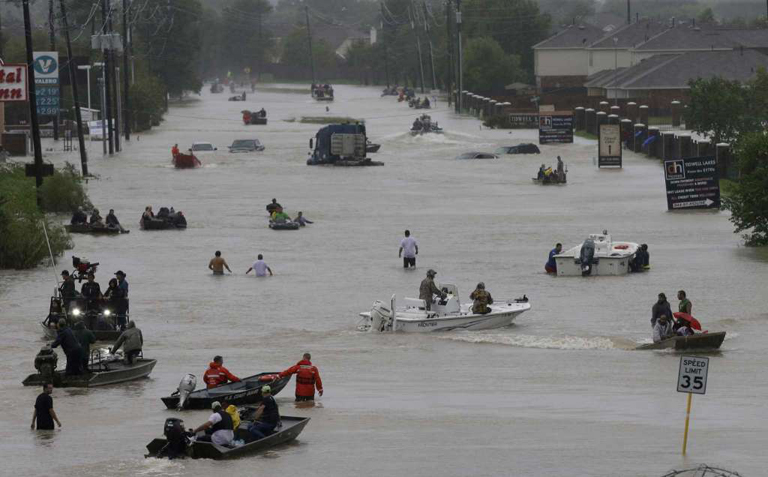
 ).
).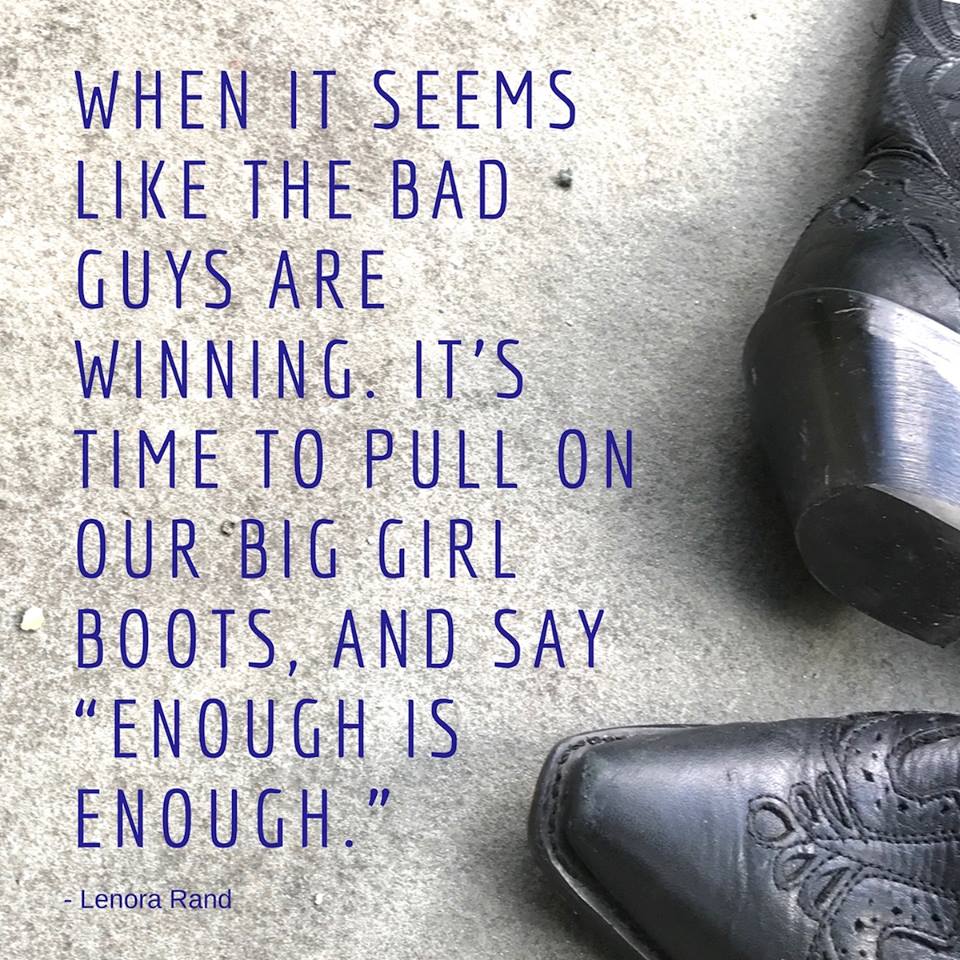 ones. Houston has some of the weakest building codes in the nation; and earlier this month President Trump rolled back provisions that would strengthen those standards in flood-prone areas.
ones. Houston has some of the weakest building codes in the nation; and earlier this month President Trump rolled back provisions that would strengthen those standards in flood-prone areas. —continue reading “
—continue reading “ or peril, blessing or curse, assurance or threat. What follows is a selection of such texts. —continue reading “
or peril, blessing or curse, assurance or threat. What follows is a selection of such texts. —continue reading “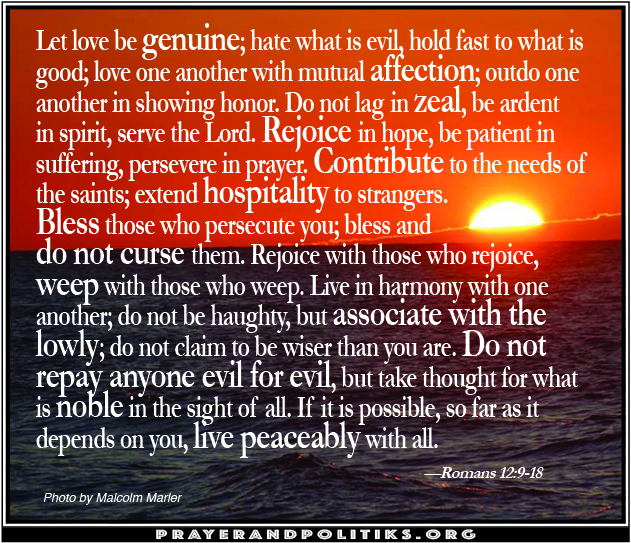 rollin' in / Man I'm standin' out in the rain / Yeah flood water keep a rollin' / Man it's about to drive poor me insane.” —Stevie Ray Vaughan, “
rollin' in / Man I'm standin' out in the rain / Yeah flood water keep a rollin' / Man it's about to drive poor me insane.” —Stevie Ray Vaughan, “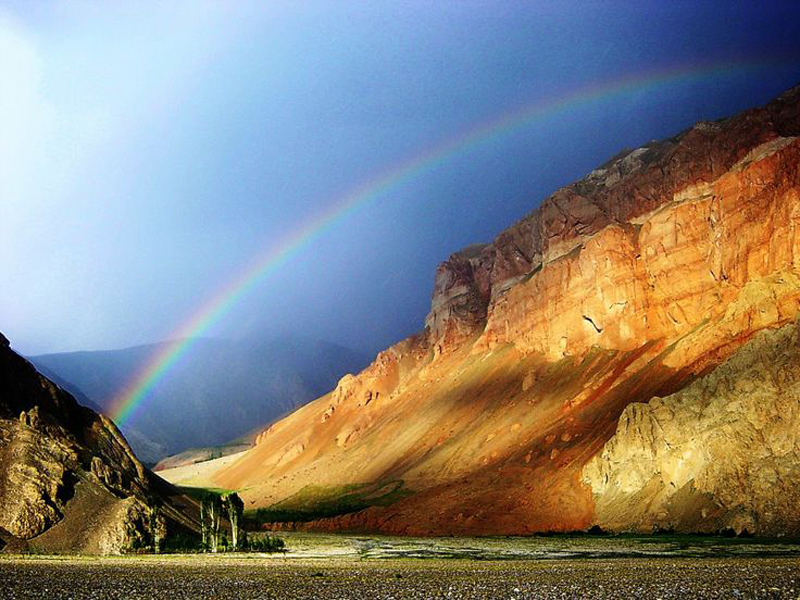
 been and never will be conquered, and will never surrender to anyone.”
been and never will be conquered, and will never surrender to anyone.” central highlands of Afghanistan around 650 BCE. Bamiyan boasted a flourishing Buddhist civilisation from the 2nd Century up to the Islamic invasion of the 9th Century. This is where the world's two largest standing Buddhas once stood, until the Taliban destroyed them in 2001 [see below].” —“
central highlands of Afghanistan around 650 BCE. Bamiyan boasted a flourishing Buddhist civilisation from the 2nd Century up to the Islamic invasion of the 9th Century. This is where the world's two largest standing Buddhas once stood, until the Taliban destroyed them in 2001 [see below].” —“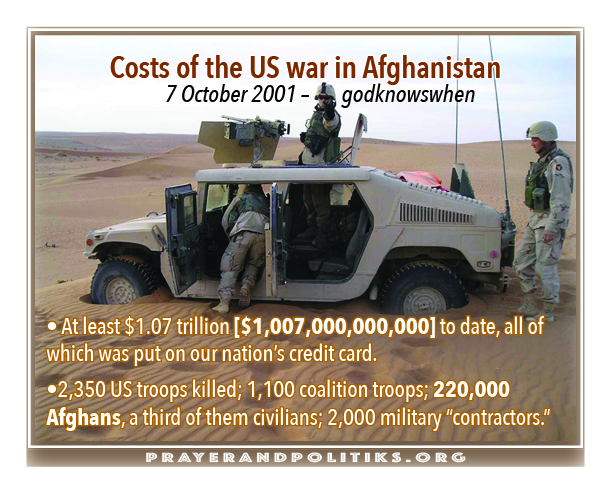 expectancy is Afghans is less than 61 years.
expectancy is Afghans is less than 61 years.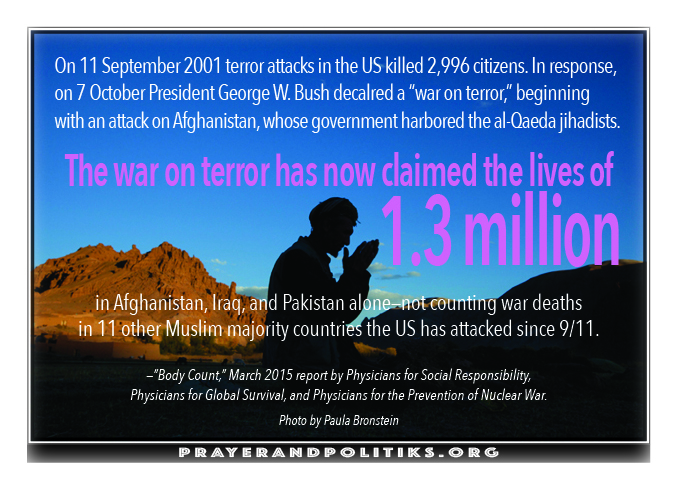 States finds itself locked in a pathologically recursive loop; we fight to prevent attacks and defend our values, only to incite further violence against ourselves and allies while destabilizing already chaotic regions. Our forces are competent, professional, and effective.
States finds itself locked in a pathologically recursive loop; we fight to prevent attacks and defend our values, only to incite further violence against ourselves and allies while destabilizing already chaotic regions. Our forces are competent, professional, and effective. watchdog says.
watchdog says.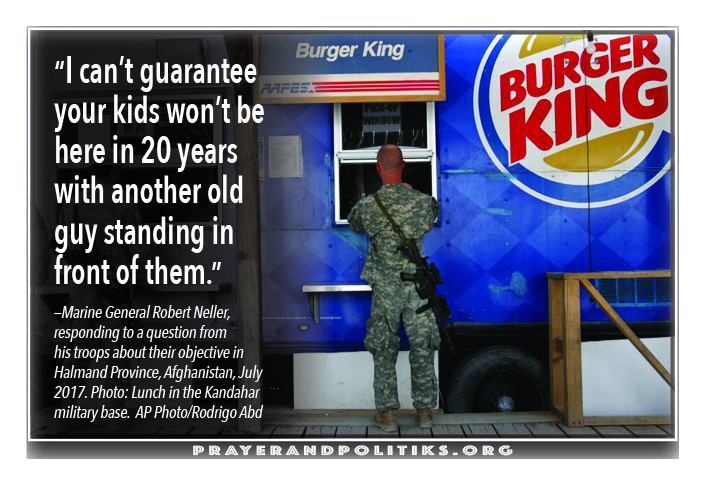 were several shades of meaning. The term, in fact, requires decoding. Yet within the upper reaches of the American national security apparatus, one definition takes precedence over all others. In Washington, freedom has become a euphemism for dominion.” —Andrew Bacevich, “
were several shades of meaning. The term, in fact, requires decoding. Yet within the upper reaches of the American national security apparatus, one definition takes precedence over all others. In Washington, freedom has become a euphemism for dominion.” —Andrew Bacevich, “ in front of them.” —Marine General Robert Neller, responding to a question from his troops about their objective in Halmand Province, Afghanistan, quote in Thomas Gibbons-Neff, “ ‘
in front of them.” —Marine General Robert Neller, responding to a question from his troops about their objective in Halmand Province, Afghanistan, quote in Thomas Gibbons-Neff, “ ‘
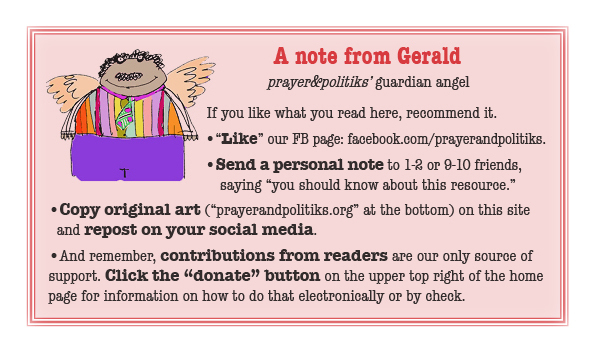 Other features
Other features
 ¶ Call to worship. “I appeal to you therefore, brothers and sisters, by the mercies of God, to present your bodies as a living sacrifice, which is your spiritual worship.” —Romans 12:1
¶ Call to worship. “I appeal to you therefore, brothers and sisters, by the mercies of God, to present your bodies as a living sacrifice, which is your spiritual worship.” —Romans 12:1 classroom.” Is this a disparagement of classroom teachers—or for that matter, pulpit preachers? I don’t think so. Good preachers and teachers know their job is to incite a thirst for learning and for revelation in the world beyond libraries and liturgies. —kls
classroom.” Is this a disparagement of classroom teachers—or for that matter, pulpit preachers? I don’t think so. Good preachers and teachers know their job is to incite a thirst for learning and for revelation in the world beyond libraries and liturgies. —kls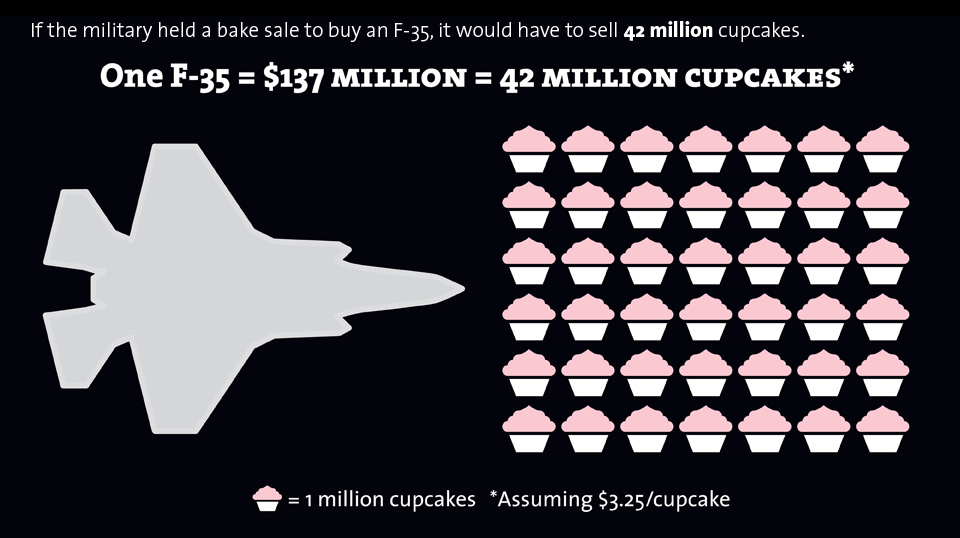 Meanwhile, back in Washington, these headlines from major media outlets:
Meanwhile, back in Washington, these headlines from major media outlets: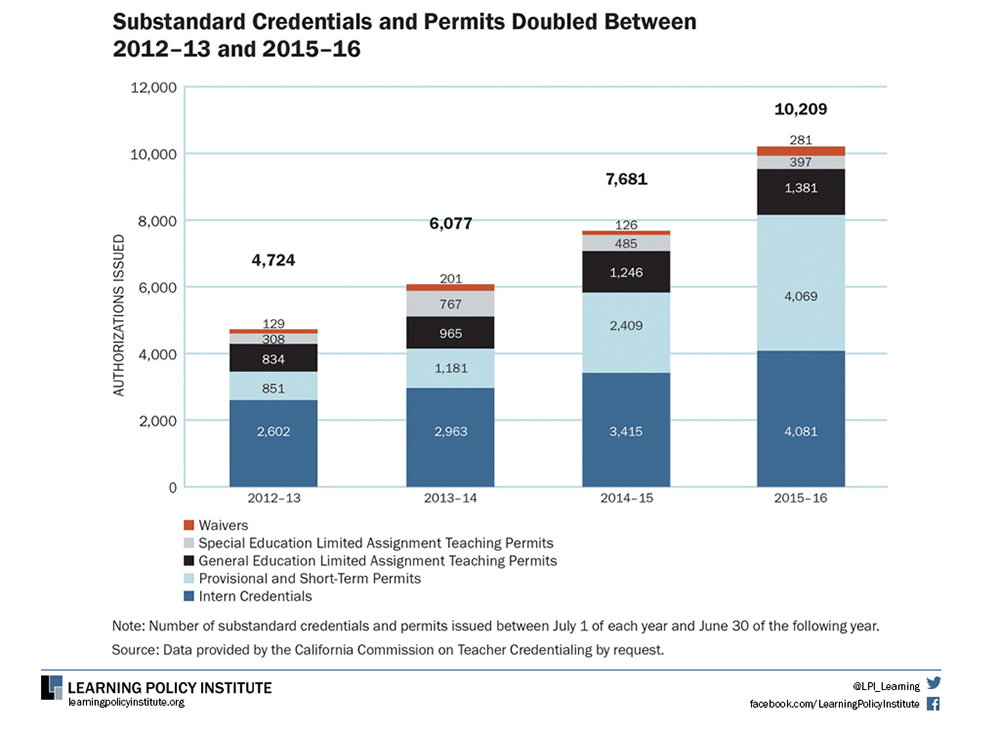
 economics at NYU who has conducted extensive research on the U.S. teaching force.
economics at NYU who has conducted extensive research on the U.S. teaching force.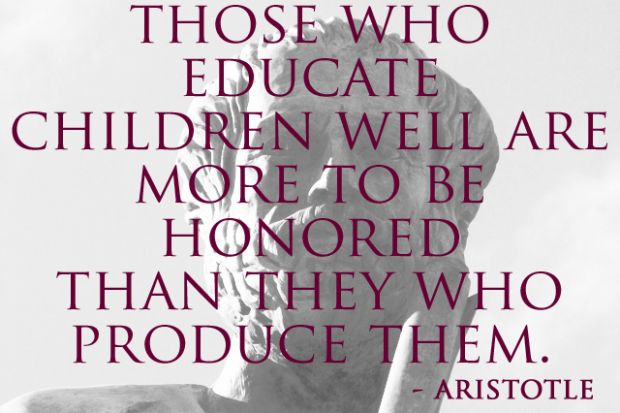 dollars to lock a child up after getting into trouble, but won’t invest a few thousand dollars to get kids born healthy, to give them a head start, to give them a decent education. We must changes these priorities.” —Marian Wright Edelman, president of the Children’s Defense Fund
dollars to lock a child up after getting into trouble, but won’t invest a few thousand dollars to get kids born healthy, to give them a head start, to give them a decent education. We must changes these priorities.” —Marian Wright Edelman, president of the Children’s Defense Fund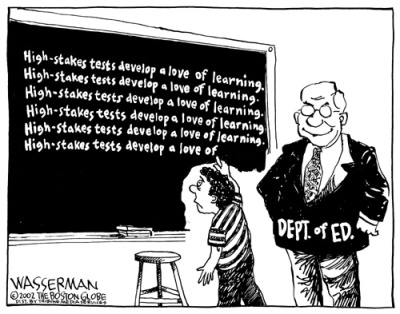
 el, beware the traffic jams.]
el, beware the traffic jams.]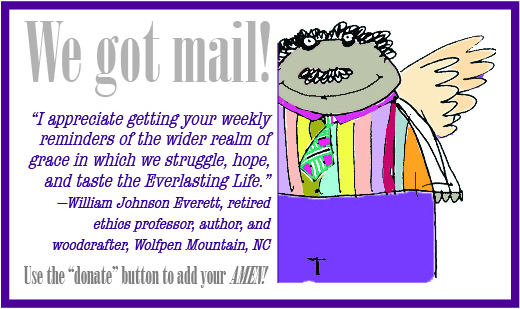 • “
• “ e version below is slightly edited.
e version below is slightly edited.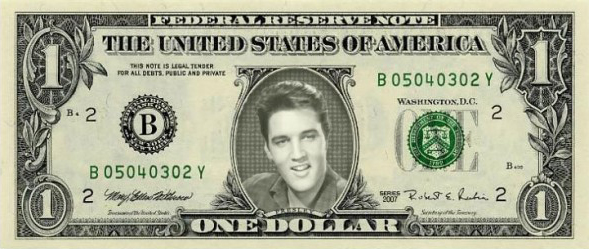 “distressed” pair of jeans for $1,495.00.
“distressed” pair of jeans for $1,495.00.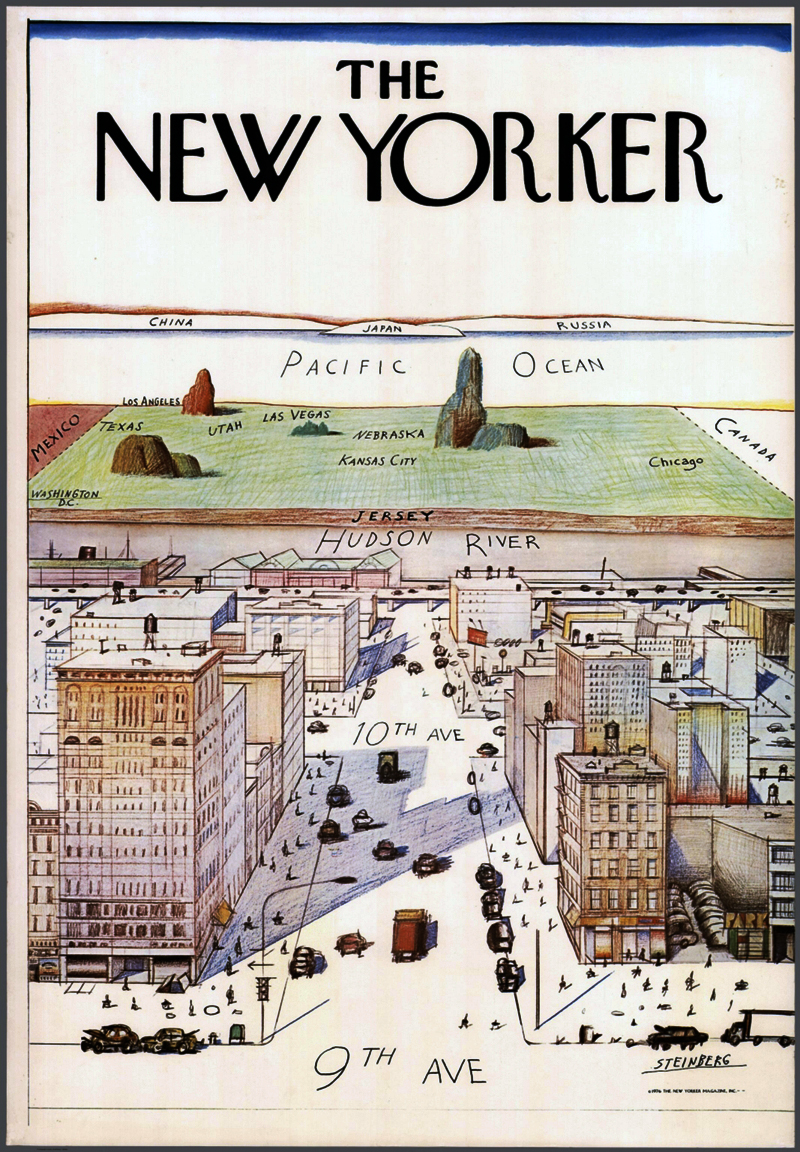 It stretches credulity. Kind of like Nathanael's incredulous response to his brother Andrew's breathless announcement that the one "of whom Moses in the law and also the prophets wrote"—the Messiah—had been found, Jesus of Narareth.
It stretches credulity. Kind of like Nathanael's incredulous response to his brother Andrew's breathless announcement that the one "of whom Moses in the law and also the prophets wrote"—the Messiah—had been found, Jesus of Narareth. of God. He was fierce, determined, and uncompromising. He was a man of miracles. He fed the hungry, raised the dead and blasted the evil empire of King Ahab and Queen Jezebel. His message was to bring down the mighty and lift the lowly.
of God. He was fierce, determined, and uncompromising. He was a man of miracles. He fed the hungry, raised the dead and blasted the evil empire of King Ahab and Queen Jezebel. His message was to bring down the mighty and lift the lowly.
 something that was still illegal in 1989.
something that was still illegal in 1989. many sides, on many sides” (he repeated for emphasis)—and then, in anticipation of his critics, assured the nation that “this has been going on for a long time”—stirred volatile emotions.
many sides, on many sides” (he repeated for emphasis)—and then, in anticipation of his critics, assured the nation that “this has been going on for a long time”—stirred volatile emotions.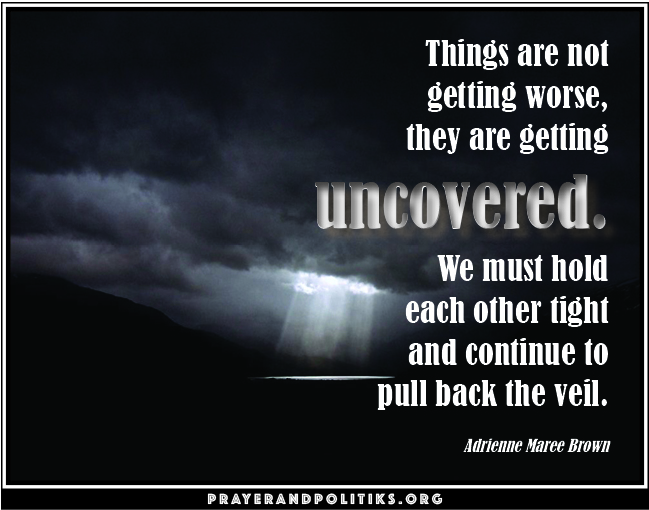 “We must hold each other tight and continue to pull back the veil.”
“We must hold each other tight and continue to pull back the veil.”